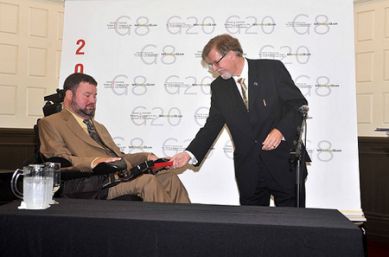G8/G20 Leaders Must Keep Promises, say Faith Leaders

As the world's most powerful leaders begin to assemble for G8 and G20 summits in Canada, members of the global faith community have issued a call for delegates to take leadership in meeting their commitments towards the Millennium Development Goals (MDG's), which include ending poverty and wars and protecting the environment.
"This September, we approach the two-thirds point for the deadline to fulfill the Millennium Development Goals–eight goals that, if achieved, would bring hope to millions and be a major step toward a more sustainable global future," reads the closing statement from the World Religions Summit 2010, held in Winnipeg, Canada from June 21-23.
The statement was drafted and signed by 80 religious leaders from 20 countries representing Aboriginal, Bahá'í, Buddhist, Christian, Hindu, Jewish, Muslim, Shinto, and Sikh religious traditions.
Among the summit's distinguished guests were the Rev Dr. Andre Karamaga, general secretary of the All Africa Conference of Churches; His Holiness Aram I, Catholicos of Cilicia; the Rev. Jim Wallis, founder of Sojourners, John McArthur of Millennium Promise. Canadian Senatar Romeo Dallaire, who was a U.N. peacekeeper during the Rwandan genocide, also participated.
"As people of faith and as concerned global inhabitants, we urge our communities to do our part to end poverty, care for the Earth and invest in peace, including building a movement of political participation that makes seemingly impossible change possible," the statement continues. "In a spirit of positive collaboration, acknowledging that both political leaders and faith leaders carry tremendous responsibility for setting the parameters for our common life, we will monitor the decisions our government leaders take, including decisions made at the 2010 political leaders' summits in Canada."
"We expect follow-through on past promises. We expect bold new actions based on the values and recommendations outlined here," they add.
"If we fail in these goals, we fail our children who look to us to secure a viable future for them. Our prayers and wishes for wisdom and compassion are with our political leaders at this critical moment."
The group's statement comes just days before Friday's G8 Summit, where leaders from Canada, France, Germany, Italy, Japan, Russia, the United Kingdom, and the United States, will meet in Huntsville, Ontario, Canada to address issues such as economic recovery after the financial crisis, global development, and security. Representatives from ten developing countries, including Nigeria and Haiti, have also been invited to participate.
An accountability report released on Monday by G8 participants revealed that the countries are $18 billion behind the five-year, $50 billion commitments they made in 2005 in Scotland.
"In some areas, the G8 can point to considerable success; in others, it has further to go to fully deliver on its promises," the report states.
Alongside leaders at the religions summit, groups such as World Vision and Caritas Internationalis are clamoring for the G8 and G20 -which includes countries such as China, India, and Brazil, and will meet immediately following the G8 summit- to ensure that feeding the world's 1 billion malnourished people is high on their agenda.
"Making sure parents can adequately feed their children must be the first priority for food security funding or the G8 will fall short on their promises to cut child and maternal deaths," said Robert Zachritz, director of advocacy and government relations for World Vision in the United States.
Caritas Canada Executive Director Michael Casey says that global agricultural policies must promote the small farmer and local food production.
"G8 and G20 countries must show the necessary leadership to reverse disastrous food policies of the past," Casey said. "Aid commitments must also be met."
"We need more aid, better spent," he added. "And we need to see effective action on climate change."
Other groups have spotlighted issues such as clean water and maternal health.
"Ensuring everyone has clean water, and a safe, hygienic place to go to the toilet, is critical to the health of women and children," said Paul Cook, advocacy director at UK-based charity Tearfund, noting that dirty water and poor sanitation account for 1 in 4 deaths of children under five.
"Efforts to reduce the number of mothers and children dying will be seriously undermined if the water and sanitation crisis is not tackled," he added. "G8 leaders must not overlook this key piece of the puzzle in their efforts to save women and children's lives."
Pregnancy or child-related issues account for the deaths of some 340,000 women each year, according to Tearfund, who note that children who lose their mother are ten times more likely to die before their second birthday.